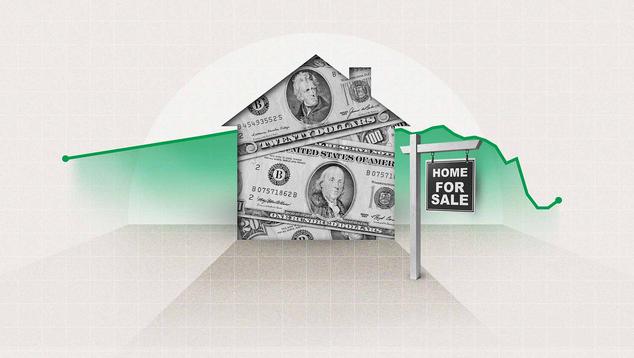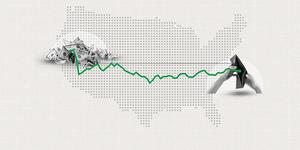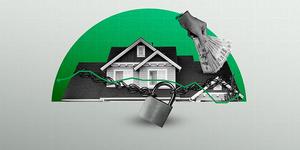WASHINGTON, D.C. — Homeownership appears to be further out of reach for non-homeowners in the U.S. Two-thirds of these Americans report being priced out of the market, and the smallest percentage recorded in years say they expect to buy a home within the next five or 10 years. More generally, Americans remain broadly skeptical about the housing market, as they have been since 2022, with the majority saying it’s a bad time to buy a house.
These results are based on Gallup’s Economy and Personal Finance survey, conducted April 1-14.
Fewer Non-Homeowners Expect to Buy in the Short Term
The survey finds that 62% of Americans say they own a home, while 34% indicate they rent, which is similar to the figures from recent years. Homeownership rates were higher before the housing crash in the late 2000s, consistently registering 70% or higher between 2005 and 2009.
It doesn’t appear that homeownership rates are likely to increase substantially in the near future. Among those who do not own a home, 30% think they will buy one within the next five years, 23% in the next 10 years and 45% not for the foreseeable future.
The percentage of those who expect to buy in the near term is significantly lower than what ┐█┐█┤ź├Żmeasured in prior surveys, all conducted between 2013 and 2018, when no fewer than 41% of non-homeowners expected to buy a home in the next five years. Similarly, the combined percentage planning to buy within five or 10 years, 53%, is the lowest that ┐█┐█┤ź├Żhas recorded.
Home renters say the cost of homeownership, including a down payment, is the major barrier to purchasing for them; it is also a bigger barrier for them than in the past. Among U.S. adults who currently rent their home, 68% say they do so because they cannot afford to buy a home or do not have enough money for a down payment. When ┐█┐█┤ź├Żlast asked this question in 2013, 45% gave this reason.
Renting appears to be more a result of economic circumstances than an intentional lifestyle choice. Only 11% of renters say it is more convenient to rent, and 1% say they rent because they are older and downsizing. Almost every other reason given for renting has some economic aspect to it. In addition to the high cost of owning, other renters cite the housing market, bad credit, high property taxes or job considerations as reasons they rent their home.
Housing Market Pessimism Persists
One factor in depressed homebuying intentions is Americans’ view of real estate market conditions. Americans continue to view the housing market unfavorably, with 72% saying it is a bad time to buy a house and 26% saying it’s a good time. Those assessments are slightly less dour than in 2023 and 2024, when record lows of 21% said it was a good time to buy a home. But they are far worse than the rest of the trend, from 1978 to 2021, when Americans were consistently more positive than negative about homebuying.
The high point in the trend was 81% saying it was a good time to buy in 2003. While it sank to 52% in 2006, it remained at or above 50% until 2022, when the percentage saying it was a good time to buy fell to 30% amid soaring inflation and record-high median U.S. home values.
While most demographic subgroups are slightly less negative about the homebuying market now than they were a year ago, the changes appear to be driven largely by politics. Thirty-three percent of Republicans, up from 18% a year ago, say it is a good time to buy a house, reflecting Republicans’ typical surge in optimism about national conditions and the economy with a Republican in the White House. Meanwhile, the already weak optimism among Democrats (now 20%) and independents (26%) is largely unchanged.
Reduced Majority Expect Home Prices to Rise
Fifty-seven percent of U.S. adults expect housing prices in their local area to increase over the next year, while 28% believe prices will stay the same and 13% predict they will decrease. Last year, 68% expected price increases, just short of the record-high 71% measured in 2021.
In most years since ┐█┐█┤ź├Żfirst asked the question in 2005, majorities have believed local home prices would rise, except from 2008 to 2012 in the years after the housing bubble burst and in 2020 near the beginning of the COVID-19 pandemic.
Among key subgroups, Republicans show the biggest change in expectations for local home prices. This year, 48% of Republicans, down from 69% in 2024, think prices will increase. Expectations for rising home prices have fallen six percentage points among both Democrats (to 60%) and independents (to 61%).
Americans living in the South and West show similar declines in expectations for rising home prices, at 17 points and 16 points, respectively, with a smaller nine-point drop among those living in the Midwest and no change among Eastern residents.
That leaves Eastern residents as the regional subgroup most likely to expect local home values to rise — 69% — compared with between 51% and 57% of those living in other regions.
Implications
While home values have come down slightly from their 2022 peak, they remain well above levels from a decade ago. Combined with elevated interest rates that make home mortgages more expensive, many prospective homeowners are priced out of the market. Not only do fewer non-owners than a decade ago expect to buy a home within the next five years, but nearly half say they are unlikely to buy one in the foreseeable future.
These diminished homebuying intentions come as majorities of Americans continue to perceive the market as unfavorable for homebuyers and think that prices will increase over the next year. Nevertheless, likely because of the rise in home values relative to other financial assets, Americans still rank real estate as being the best long-term investment. The challenge lies in making that investment option more attainable to a wider segment of the U.S. adult population.
To stay up to date with the latest ┐█┐█┤ź├ŻNews insights and updates, follow us on X .
Learn more about how the works.
View complete question responses and trends (PDF download).




